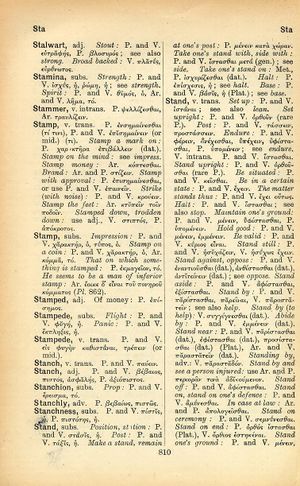stand: Difference between revisions
ξένῳ δὲ σιγᾶν κρεῖττον ἢ κεκραγέναι → it's better for a stranger to keep silence than to shout (Menander)
m (Woodhouse1 replacement) |
mNo edit summary |
||
| Line 91: | Line 91: | ||
[[stand to]], [[abide by]]: [[prose|P.]] and [[verse|V.]] [[ἐμμένειν]] (dat.), [[prose|P.]] [[μένειν ἐπί]] (dat.). | [[stand to]], [[abide by]]: [[prose|P.]] and [[verse|V.]] [[ἐμμένειν]] (dat.), [[prose|P.]] [[μένειν ἐπί]] (dat.). | ||
[[it stands to reason]]: [[prose|P.]] and [[verse|V.]] [[ | [[it stands to reason]]: [[prose|P.]] and [[verse|V.]] [[εὔλογον ἐστι]], [[εἰκός]] ([[ἐστι]]). | ||
[[stand up]]: [[prose|P.]] and [[verse|V.]] [[ἀνίστασθαι]]; see [[rise]]. | [[stand up]]: [[prose|P.]] and [[verse|V.]] [[ἀνίστασθαι]]; see [[rise]]. | ||
Revision as of 11:12, 7 June 2020
English > Greek (Woodhouse)
substantive
position, station: P. and V. στάσις, ἡ.
make a stand, remain at one's post: P. μένειν κατὰ χώραν.
take one's stand with, side with: P. and V. ἵστασθαι μετά (gen.); see side.
take one's stand on: Met., P. ἰσχυρίζεσθαι (dat.).
halt: P. ἐπίσχεσις, ἡ; see halt.
base: P. and V. βάσις, ἡ (Plato); see base.
verb transitive
set up: P. and V. ἱστάναι; see also lean.
set upright: P. and V. ὀρθοῦν (rare P.).
post: P. and V. τάσσειν, προστάσσειν.
endure: P. and V. φέρω, φέρειν, ἀνέχεσθαι, ὑπέχειν, ὑφίστασθαι, P. ὑπομένειν; see endure.
verb intransitive P. and V. ἵστασθαι.
stand upright: P. and V. ὀρθοῦσθαι (rare P.).
be situated: P. and V. κεῖσθαι.
be in a certain state: P. and V. ἔχειν.
the matter stands thus: P. and V. ἔχει οὕτως.
halt: P. and V. ἵστασθαι; see also stop.
maintain one's ground: P. and V. μένειν, ὑφίστασθαι, P. ὑπομένειν.
hold good: P. and V. μένειν, ἐμμένειν.
be valid: P. and V. κύριος εἶναι.
stand still: P. and V. ἡσυχάζειν, V. ἡσύχως ἔχειν.
stand against, oppose: P. and V. ἐναντιοῦσθαι (dat.), ἀνθίστασθαι (dat.), ἀντιτείνειν (dat.); see oppose.
stand aside: P. and V. ἀφίστασθαι, ἐξίστασθαι.
stand by: P. and V. παρίστασθαι, παρεῖναι, V. παραστατεῖν; see also help.
stand by (to help): V. συγγίγνεσθαι (dat.).
abide by: P. and V. ἐμμένειν (dat.).
stand near: P. and V. παρίστασθαι (dat.), ἐφίστασθαι (dat.), προσίστασθαι (dat.) (Plato), Ar. and V. παραστατεῖν (dat.).
standing by, adv.: V. παρασταδόν.
stand by and see a person injured: use Ar. and P. περιορᾶν τινὰ ἀδικούμενον.
stand off: P. and V. ἀφίστασθαι.
stand on, stand on one's defence: P. and V. ἀμύνεσθαι.
in case at law: Ar. and P. ἀπολογεῖσθαι.
stand on ceremony: P. and V. σεμνύνεσθαι.
stand on end: P. ὀρθὸς ἵστασθαι (Plato), V. ὄρθιος ἑστηκέναι.
stand one's ground: P. and V. μένειν, ὑφίστασθαι, P. κατὰ χώραν μένειν, ὑπομένειν.
stand out, be conspicious: P. and V. φανερὸς εἶναι.
project: P. and V. προὔχειν, Ar. and P. ἐξέχειν, P. ἀνέχειν.
stand over: P. and V. ἐφίστασθαι (dat.).
let stand over: P. and V. ἐᾶν (acc.); see defer.
stand round: P. and V. περιίστασθαι (Eur., Bacchae 1106), V. ἀμφίστασθαι.
standing round, adj.: P. and V. περισταδόν.
stand to, abide by: P. and V. ἐμμένειν (dat.), P. μένειν ἐπί (dat.).
it stands to reason: P. and V. εὔλογον ἐστι, εἰκός (ἐστι).
stand up: P. and V. ἀνίστασθαι; see rise.
stand up for: see defend.
stand upon: see stand on.

